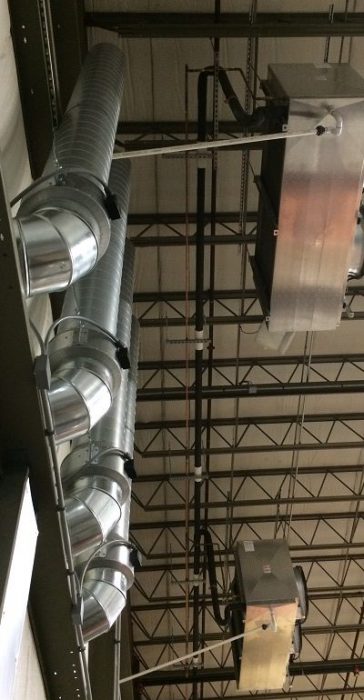Richard Doughty, ERS, for Zondits. March 15, 2016. Image credit: Luke Truman
Allagash Brewing Company started as a one-man operation in a small corner of a warehouse in Portland, Maine. Founder Rob Tod sold his first batch of beer in the summer of 1995. Since that time, Allagash has grown and expanded – available in 17 states and the District of Columbia, with a workforce of 100 strong. They brew all of their beer in a building next to where Rob started, and they cellar and package experimental beers in the original building. They also lease an off-site warehouse for shipping, receiving, and secondary fermentation.
 Zondits spoke with Luke Truman, a lead member of the Allagash Maintenance Department, to learn more about the Freeaire system installed in the refrigerated space of their shipping warehouse. Luke joined the Allagash sustainability team, or Green Team, in 2012, and took over the leadership role in April of 2015. The purpose of this team is to recognize opportunities to reduce the company’s impact, from process changes to reduce water and chemical consumption to investments in energy-saving technology. The Green Team also serves as an advisory team on construction projects and day-to-day purchasing.
Zondits spoke with Luke Truman, a lead member of the Allagash Maintenance Department, to learn more about the Freeaire system installed in the refrigerated space of their shipping warehouse. Luke joined the Allagash sustainability team, or Green Team, in 2012, and took over the leadership role in April of 2015. The purpose of this team is to recognize opportunities to reduce the company’s impact, from process changes to reduce water and chemical consumption to investments in energy-saving technology. The Green Team also serves as an advisory team on construction projects and day-to-day purchasing.
Has the Freeaire system met Allagash’s expectations for energy savings and system performance?
The Freeaire system has the capability to log when the compressors and evaporators would normally cycle on, which allows us to monitor the real-time savings of the system. We installed this system roughly 6 months ago, and the energy savings viewed on the Freeaire database are as predicted, even with an exceptionally warm winter.
Strictly comparing bills from last winter to this winter, the savings don’t seem as high, but there are several factors to consider before jumping to conclusions. Our overall energy consumption at this warehouse has gone down an average of 15% a month since the installation.
The Freeaire system has been a seamless addition and has caused no issues whatsoever. It has performed exactly as we had hoped.
[bctt tweet=”The Freeaire installation has reduced this Allagash warehouse’s energy consumption by 15% a month.”]

Have conditions with the refrigerated space changed as a result of the installation? If so, how have they changed?
The primary change in this space has been the noise level. The cooler is a much quieter place to be without the evaporators running nonstop. We have noticed a 1-degree decrease in a digital temperature display placed as far from the evaporators as possible, which is negligible in a good direction. Based on the location of the sensors for the Freeaire system, this difference is most likely a more accurate depiction of temperature of the space.
Do you intend to install Freeaire systems in other refrigerated spaces at your facility? Would you recommend Freeaire to others?
We decided to install the Freeaire system in our largest refrigerated space as a way to pilot Freeaire. Thus far the system works flawlessly and allows us to monitor and control the equipment cooling this space in real-time from the brewery or home. Based on the functions provided by this system, as well as its reliability, we do intend to install more Freeaire systems throughout our facility.
In addition to the system working as designed, the installers followed our demands to the T, including the locations of controls to the conduit used.
I would definitely recommend Freeaire to others.
What is the “coolest” thing about the Freeaire installation?
I would say the “coolest” thing about the Freeaire installation has to be the silence in the cooler. On the maintenance end, it is great to have the monitoring system at my fingertips and know that reduced run time will lead to longer equipment life. But on a sustainability front, it is so nice to hear a piece of equipment not run when it doesn’t need to. The silence is a reminder that we aren’t running mechanical cooling when we don’t need to.
What influence did the Efficiency Maine program have on your decision to install the Freeaire system?
The Efficiency Maine program was definitely a huge help with initiating the first Freeaire installation. It is a lot easier to justify a project when someone is offering to help pay for it! Also, Efficiency Maine’s approval of the technology and validation of the predicted energy savings adds to the creditability of the proposal.
